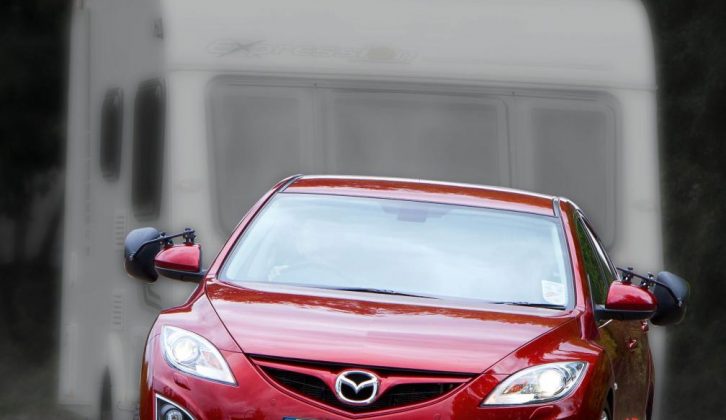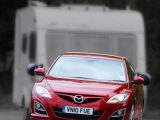How Much Torque Do I Need to Tow a Caravan
How to… Choose a tow car
Make sure you buy the right tow car to ensure you can tow in safety and with confidence with Practical Caravan's top tips and independent advice


You may well have your dream caravan, but it won't be much use to you without the right tow car. You can always take a test drive to assess a car's solo performance, but doing so with a caravan hitched on the back is quite another matter. There are, though, a number of ways of spotting a good tow car without towing with it first.
When towing, you shouldn't do anything in a hurry. Always accelerate, brake and change direction smoothly. Be decisive, but don't be rushed.
The same is true when choosing a tow car. Buy on a whim, in a rush or without doing your research first, and you're on the road to making an expensive mistake. Think carefully about your needs before you set foot in the showroom or start circling cars in the classifieds. Take your time and you'll buy a better, safer tug.
You'd be surprised how many letters and emails the Tow Car Helpline receives from caravanners who have just bought a new car or caravan and want to know if their outfit is a safe match. Telling them it's not brings a smile to nobody's face.
If you're happy with your tourer and want a car to tow it with, your starting point is the weight of your caravan. Use the Maximum Technically Permissible Laden Mass (MTPLM) of the caravan rather than the Mass in Running Order (MiRO), as most caravanners tow close to the maximum once the van has been loaded up with awnings, pup tents, clothes and so on. To be really belt and braces, you could weigh your loaded caravan at a weighbridge.
Most of you will know that both major caravanning clubs recommend that a caravan weigh no more than 85% of the kerbweight of the towcar for safe and stable towing. This applies particularly to inexperienced tow car drivers, but it's a sensible guideline for all of us.
To calculate the minimum kerbweight necessary to abide by the 85% guideline, take the MTPLM, divide it by 85 then multiply the result by 100. Say your caravan has an MTPLM of 1300kg. Divide 1300 by 85 and you get 15.29. Multiply this by 100 and the result is 1529. That means you should look for a car with a kerbweight of 1529kg or more.
Most manufacturers' websites or printed brochures will list kerbweights for new models (they'll sometimes be listed as the 'unladen' weight). If you're looking for the kerbweight of a used car then the Towsafe database is a good starting point. You can carry out five matching calculations for £15.95.
You'll also need to take account of the towing limit of any potential tow car. In most cases the legal towing limit is higher than the 85% limit, but not in all. The legal limit should never be exceeded and if it's below the 85% limit then you'll have to make sure your caravan's weight is within this figure before adding it to your shortlist.
Some cars will have legal towing limits that are much higher than the car's kerbweight, let alone the 85% figure. John Shepherd, a regular forum contributor and a tow car driver for over 40 years, strongly advises against being tempted to tow at a sky-high legal limit. "Dogs wag tails, not the other way around," he says.
Also consider the caravan's noseweight limit. This isn't always easy to discover, but Towsafe should provide the answer. Ideally, the noseweight should be 7% of the laden weight of the caravan, but in reality this is often difficult to achieve, so aim for a noseweight of no less than 4%.
Look at the power and torque (or twisting force) figures of the engine, too. Way back when, caravanners were often advised that 40bhp per tonne was needed when towing, but it's torque that really counts. A modern equivalent of that old rule is that a car with 80lb ft of torque for every tonne of car and caravan should give strong performance. Many will be able to tow happily with less, but drop to 60lb ft per tonne and acceleration will be quite sluggish.
Perhaps you're starting with a blank sheet of paper, and shopping for both car and caravan. If this is the case, you need to treat both decisions as part of the same process. It's no good deciding on the ideal car and caravan, then discovering that the car isn't heavy enough. Be ready to compromise to find a suitable combination.
One catch-all solution, which some two-car households reach, is to have one car for towing (perhaps a big, heavy 4×4) and a smaller, more economical car for day-to-day driving.
Unless you are in a position to tow with one car and drive another most of the year, the vehicle that pulls your caravan will have to meet your other needs, too. As reader-contributor and Tow Car Awards judge Nigel Hutson puts it: "Remember; 99% of the time your car won't be towing." That means you should think carefully before buying a car that is more than heavy enough for your towing needs, but thirsty and cumbersome to drive solo. It has to be suitable for the daily commute, shopping run and trips to the tip, too.
With a good idea of the type of vehicle you need and the kerbweight necessary for it to make a good match for your caravan, you can start to narrow things down to more specific models. Use many different sources of information, including professional road tests, owner reviews on the internet, reliability and customer satisfaction surveys, and word of mouth. We would say this, wouldn't we, but look through our tow car reviews and our annual Tow Car Awards, too, to help work what what tow car is best for you.
Not all sources will agree about which cars are best, and even the best-regarded models will have dissatisfied owners online. However, if you find a car that scored well in the Tow Car Awards, has a positive report in the JD Power Customer Satisfaction Survey, and many favourable reviews from owners, you know you are on to a good thing.
Perhaps you're the type who has always owned cars of a particular make, has a good relationship with your local garage, and is in no hurry to change any of that. Fair enough. For the rest of us, though, we'd recommend test driving at least three different models. Your first choice on paper may not be as good as you expect, and your third-favourite could surprise you.
Whether buying new or used, from a dealer or privately, never rely on the seller for matching advice. Motor traders don't necessarily know the first thing about towing, and are likely to tell you that towing up to the legal towing limit is sensible. If you've done your homework on kerbweights first, you won't get confused by such sales-speak.
One of the biggest headaches when choosing a tow car is that you won't have the chance to tow before signing on the dotted line. So it's all the more important that you go for a long test drive on a variety of roads. If the owner or dealer strikes up a conversation, politely ask them to save the chat for when the test drive is over. You need to concentrate.
If the car's acceleration is pedestrian when driving solo, chances are it's going to struggle with a caravan behind it. Work your way through the gears. Are there any large gaps in the gear ratios, which could allow the engine to bog down? Does the engine labour at very low revs? Also make sure you try a hill start. If this feels as though it's a big ask solo, then things are going to get a good deal harder once there is a tonne of caravan in tow.
Also, pay close attention to the way the car rides bumps, advises Nigel Hutson: "If the car is sloppy when solo, it will be awful when towing."
There's no doubt that self-levelling suspension helps when towing, so check if this is standard or optional. If it's not, or you're looking at a used car which doesn't have self-levelling fitted, this doesn't necessarily mean the car should be ruled out, as Nigel discovered a few years back: "I once had a car that was soft at the rear, but in other respects was a decent tow car. I invested in a pair of good dampers and a set of heavy duty springs. The total cost was less than £100 (10 years ago), but it transformed the car both solo and towing – especially towing."
When you get back from the test drive, don't rush into a hasty decision. Only buy once you have tested all the cars on your shortlist, and be sure to haggle before agreeing to a price. The What Car? Target Price will give you a figure to aim for if you are buying a new car, while used car price guides such as Glass's or, again, What Car? will provide valuations for used cars.
Don't buy until you are happy with both the car and the price. Remember, there are other vehicles and other sellers if you can't reach an agreement.
Watch out! Here are 5 tow cars to catch the unwary
- Vauxhall Zafira Towing limits are often below 85% of the kerbweight, unless you go for the biggest diesel models. Even then, 1500kg is the limit. Some models may tow up to 1300kg and others, such as the the 1.6 petrol, as little as 1000kg.
- Renault Espace Looks big but is quite light and Renault uses very complex rules to calculate the towing weight, depending on the number of passengers.
- Jaguar S-Type Great tug, but towbar installation on this complex executive express can run into four figures.
- Small Peugeots Towball limits vary depending on the engine. One 207 model is not homologated for towing, while others may be 38-46kg. The limit for the 308 hatchback varies from 58kg to 68kg.
- Toyota Verso Nice seven-seat family car in most respects, but 2010 versions are saddled with a silly 55kg towball limit and a 1300kg towing limit.
Need more help? Read crucial top tips from our experienced team of tow car experts, click here to make sure you have a licence that entitles you to tow, and be sure to go here for the facts and figures you need before you buy. Bought the wrong car? Fear not! Our advice on what do to is here.
If you're happy with your tourer and want a car to tow it with, your starting point is the weight of your caravan
How Much Torque Do I Need to Tow a Caravan
Source: https://www.practicalcaravan.com/news/how-to-choose-a-tow-car